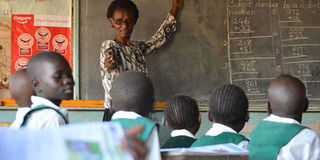Make mother tongue fulcrum of CBC

Pandipieri Primary School, in Kisumu, Grade Three pupils are taught arithmetic on May 20, 2019. The competency-based curriculum is meant to exploit the learner’s potential, irrespective of which language they know. PHOTO | ONDARI OGEGA | NATION MEDIA GROUP
What you need to know:
- Research indicates that when a child masters a mother tongue, it is easy to master a second language in what is, in linguistics, referred to as linguistic interdependence.
- The CBC gives us an opportunity to re-engineer classroom communication to guarantee learners’ development of their inherent abilities to the fullest.
Since the new competency-based curriculum (CBC) is anchored on teacher-learner communication and developing learner capacities, it matters what language is used to teach and learn.
The Kenya Institute of Curriculum Development (KICD) states that languages of the catchment will be used.
All language learning theories indicate that generous input is a prerequisite for learning a first and subsequent languages.
Input refers to what a learner of language X hears. Children are not born with languages; they hear them from the surroundings — at home, at play with peers and in the community.
However, exotic second languages, such as English, are, in a majority of cases in Kenya, not acquired at home but mainly in schools — except in some middle-class urban families.
ENGLISH
Most children from such families are enrolled in private schools with adequate facilities and have access to television, newspapers and family members who speak in English on a regular basis.
Children from rural areas, and Kenya is predominantly rural, in most cases hear English in classrooms and it is used formally. Classroom English is cognitively demanding as it is rich in subject content jargon.
It does not, by its nature, facilitate acquisition of proficiency in the language amongst these learners.
Not surprisingly, some researchers indicate that the majority of children exiting lower primary school in Kenya can only read English words but cannot explain their meaning.
Small wonder, too, that the majority of primary school classrooms are predominantly ‘teacher-centred’; children have ideas, but since teachers demand that classroom communication should be in English, learners keep quiet.
MOTHER TONGUE
Teachers admit that when they allow pupils to use their mother tongues or the national language Kiswahili, it enhances learner participation and classroom communication — which is core in facilitating learning.
Mother tongue is the language one acquires first. In the Kenyan context, it, generally, refers to the 42 local languages. We may also rightly refer to them as languages of the catchment.
Mother tongues should be the fulcrum in the implementation of the CBC, especially in lower primary school.
On entry to primary school, a child’s many ideas can be articulated using words in the language spoken where they were born and brought up.
The role of the school is to use that language as a foundation to build the child’s knowledge.
COMPREHENSION
To be fair to the child, one must use the local language to teach mathematics, social studies, science and other subjects since, at the child’s level, the syllabus deals with their immediate surroundings, most of which they know.
If English is used in such a context, learning outcomes and literacy development will be dismal.
The child will struggle to learn English first and then try to understand the knowledge communicated in it.
Research by the World Bank, Unesco and others worldwide indicates that, for optimal and sustainable learning and literacy development, languages that children know well must be used in most of primary education — at least up to the second half — but at best through the entire level.
Further research indicates that, should a second language be preferred — especially in second-language contexts like in Kenya — the pupils should have been taught the second language as a subject for a minimum of eight years.
INTERDEPENDENCE
The language a child knows when they enter school should be used to learn subject content knowledge and any other in the curriculum taught as a subject only.
In the case of Kenya, the languages these pupils know are the 42 local tongues and, in big towns, mainly Kiswahili.
In cities such as Nairobi, this can be English in the upmarket neighbourhoods and Kiswahili in mid-level estates and informal settlements.
The CBC is meant to exploit the learner’s potential, irrespective of which language they know.
Research indicates that when a child masters a mother tongue, it is easy to master a second language in what is, in linguistics, referred to as linguistic interdependence.
Multilingual teaching experiments show that children in primary school who acquire literacy in a mother tongue and are also taught content knowledge in it outperform those taught in a second language in both content subject knowledge and in the second language.
The CBC gives us an opportunity to re-engineer classroom communication to guarantee learners’ development of their inherent abilities to the fullest. Let them say what they know in their language.
Dr Mose, a lecturer and researcher, is a former postdoctoral fellow at Rhodes University, Grahamstown, South Africa. [email protected]





